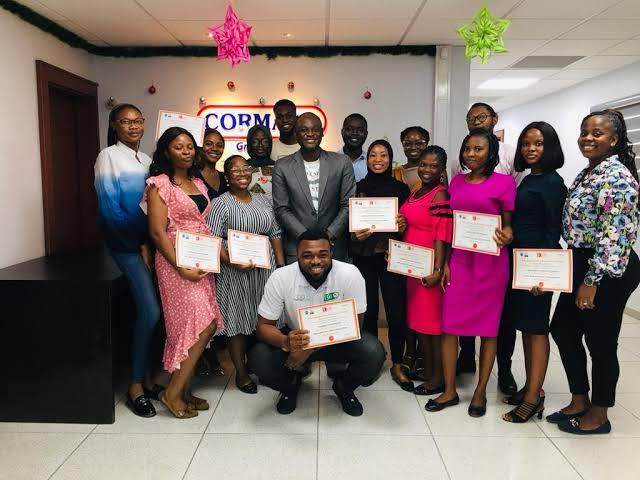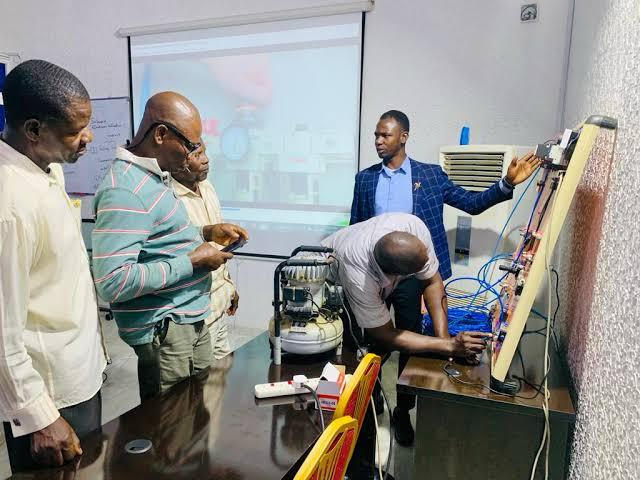After struggling to secure a job despite holding a civil engineering degree, *Mr. Adebowale A. enrolled in a three-month Electrical & Industrial Automation course at ETL Engineering School. Shortly after completing the program, he landed a job as an Electrical Technician at a leading manufacturing company.
Like Mr. Adebowale, another trainee who held only an SSCE qualification took ETL’s Industrial Electro-Mechanical Engineering course. Despite not having a university degree, he received intensive hands-on training and mentorship. Today, he has built a career as an artisan and earns a stable income.
In Nigeria, thousands of engineering graduates enter the workforce each year, but many struggle to find employment, in part due to a lack of practical experience. Most universities and polytechnics focus on theory, leaving graduates unprepared for the technical demands of real-world jobs.
From its headquarters in Ikeja, ETL Engineering Services Limited is changing that. With a curriculum centered on immersive, hands-on learning, ETL is helping to bridge the divide between academic knowledge and industry readiness. From oil and gas to manufacturing, the institution is equipping professionals with the skills employers actually need.

Bridging the technical skills gap
ETL Engineering School was founded to solve a major challenge in Nigeria’s technical education system: the lack of industry-aligned, practical training. Many higher institutions lack modern equipment and up-to-date curricular.
ETL responded by investing in state-of-the-art facilities and developing courses tailored to industry needs.
“Our mission is to deliver high-quality, industry-specific technical training that bridges the skills gap in Nigeria,” Managing Director of ETL Services, Mr. Chris Udemba, said in an interview with Ikeja Record. “We want to empower individuals with hands-on expertise so they can thrive in their careers.”
At ETL, training is structured to be 70% practical and 30% theoretical. This emphasis on real-world application sets it apart from other technical institutions. The school also provides post-training support such as internships and job placement assistance to help graduates succeed.
Tackling the challenges of technical education
Nigeria’s technical education sector faces several obstacles: outdated equipment, obsolete curricula, underfunding, and a shortage of skilled instructors. ETL has taken a proactive approach by hiring experienced facilitators, regularly updating its courses, and investing in cutting-edge equipment.
“Technical education can be expensive,” Udemba said, “but we strive to make it affordable through payment plans and partnerships with organisations that sponsor students.”
One of ETL’s facilitators, Engineer Okwori Christian, who also works in the oil and gas industry, said employers often send their staff back to ETL for advanced training after seeing results.
“Most of the people I’ve trained have progressed rapidly in their careers,” Okwori said. “They’re often promoted beyond their initial roles because the training here empowers them to exceed expectations.”
A Facilities and Operations Engineer, Mr. Godwin Aigbedion recently completed a four-day training in pipeline management. He told Ikeja Record how valuable the experience was for his team.
“It opened my eyes to pipeline operations, maintenance, and asset integrity management,” he said. “I’m grateful my company sponsored me for this training.”
Customising learning for industry needs
One of ETL’s strengths lies in its ability to tailor training programs to specific industries. The school works closely with experts to develop specialised courses in fields like oil and gas, power, and manufacturing.
Students also gain real-world exposure through site visits and industrial simulations. Tools like Programmable Logic Controllers (PLC), electrical schematic boards, HVAC systems, and shaft alignment equipment provide hands-on experience that translates directly to the workplace.
“Our training isn’t just theoretical,” Udemba said. “It’s rooted in practical engagement. We collaborate with industry professionals to keep our courses relevant.”
That real-world relevance is what drew Motunrayo Olaiya, a graduate of electrical engineering, to ETL. After discovering the school through a Google search while looking for PLC training, she enrolled and, after several months, was promoted to become a trainer.
“Now, I teach the basics of PLC automation and beyond,” Olaiya said. “It’s been a rewarding journey.”
Success stories and impact
ETL’s impact can be seen in the success of its trainees. Many graduates have gone on to secure jobs, start their own businesses, or transition into new technical fields.
One graduate of the HVAC program launched his own installation and maintenance business, creating employment opportunities in his community. Another, with no formal higher education, used his ETL training to build a stable career as an artisan.
These stories reflect ETL’s broader mission: to empower people with practical skills that lead to meaningful employment and long-term self-reliance.
Partnering to build a stronger workforce
In March 2024, ETL partnered with the Ojodu Local Council Development Area (LCDA) to train 15 youths in various technical fields, including electrical installation, electro-mechanical engineering, and HVAC system maintenance.
“We’re looking forward to launching another phase of this program soon,” ETL’s Head of Technical Services, Mr. Godwin Asuquo said.
The school also runs a unique community-based initiative called Retire to Retirement-Fire, an annual soft skills program designed for elderly retirees.
“It’s a leadership and life-skills program that empowers retired members of our community,” Asuquo said.
Preparing for the future of engineering
ETL is not just focused on the present – it’s looking ahead. With emerging technologies like Artificial Intelligence (AI), robotics, automation, and renewable energy on the rise, the school is updating its training to prepare students for the future.
ETL is currently expanding its digital learning offerings, including online courses and virtual reality (VR) simulations that replicate real engineering environments.
“We are investing in AI-driven simulation tools and smart automation trainers,” Udemba said. “We want our trainees to acquire future-ready skills.”
Plans are also underway to open a new branch in Port Harcourt, further expanding ETL’s reach into key industrial sectors across the country.
For young Nigerians interested in technical careers, ETL’s advice is simple but powerful. “Be passionate and persistent,” Udemba said. “Theoretical knowledge alone is not enough, seek hands-on training and real-world experience. Technology is always evolving, so be ready to adapt, upskill, and embrace new innovations.”
*Mr. Adebowale A. requested to be identified by first name and initial only.


